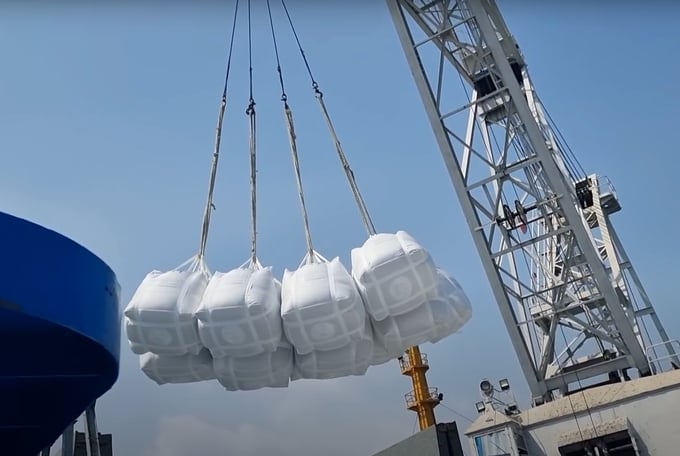November 25, 2025 | 23:17 GMT +7
November 25, 2025 | 23:17 GMT +7
Hotline: 0913.378.918
November 25, 2025 | 23:17 GMT +7
Hotline: 0913.378.918

Vietnam's rice exports surpass USD 5 billion for the first time. Photo: Son Trang.
Vietnamese rice exports have exceeded USD 5 billion this year, as reported by the General Department of Customs in mid-November. This is the first occasion in which Vietnam's rice exports have exceeded USD5 billion in a single year.
This achievement is the second consecutive year that rice export volumes have exceeded 8 million tons, as more than 8 million tons of Vietnamese rice have been sold to international markets. In 2023, the greatest volume of rice exported to date was 8.13 million tons. It is probable that the rice export volume for this year will surpass the current record by the end of November, as monthly export volumes are currently estimated to be between 600,000 and 700,000 tons.
The primary reason for Vietnam's rice exports surpassing the USD5 billion threshold was a substantial increase in export prices. The average export price of rice in the first three quarters of the year was USD 626 per ton, a 13.4% increase from the same period last year. This is equivalent to an increase of USD74 per ton.
The higher export prices of Vietnamese rice are the result of a change in the varieties of rice that are exported, as well as global price trends. Vietnam is progressively distinguishing itself in the production and export of rice by emphasizing aromatic and high-quality varieties, while simultaneously substantially decreasing the production and export of medium- and low-grade rice, as per Mr. Do Ha Nam, Vice Chairman of the Vietnam Food Association. This has resulted in the establishment of a distinctive pricing standard for Vietnamese rice.
The unique pricing of Vietnamese rice is frequently evident in its status as the highest among major exporters and, at times, substantially higher than comparable varieties of Thai rice.
Global rice export prices have experienced a substantial decline since India eliminated the minimum export price for non-Basmati rice on October 22. Despite the fact that the prices of Vietnamese rice have decreased, they continue to be the highest among significant exporters. The price of Vietnam's 5% fractured rice was USD 520 per ton as of November 26, while Thailand's prices were USD 493, India's were USD 453, and Pakistan's were USD 455. Only Vietnam's 5% broken rice is still priced at more than USD 500 per ton, out of the four largest rice-exporting countries.

Rice harvest in Dong Nai. Photo: Son Trang.
In addition, Vietnam's rice exports have surpassed the USD 5 billion threshold for the first time due to a substantial increase in rice imports by the Philippines since the beginning of the year. Over 3.6 million kilos of Vietnamese rice, valued at USD 2.2 billion, were exported to the Philippines during the first ten months of this year. The Philippines accounted for 47% of the export volume and 46% of the export value of Vietnamese rice. With both export volume and value reaching their highest levels ever, this is the third year in a row that rice exports to the Philippines have surpassed USD 3 billion. In particular, the Philippines' export value surpassed USD 2 billion for the first time, following a four-year period in which it fluctuated between USD 1 billion and nearly USD 2 billion.
Rice has become the second agricultural product in Vietnam to attain an export value of USD 5 billion, following fruits and vegetables. Fruit and vegetable exports surpassed USD5 billion for the first time in 2023, surpassing USD6 billion in the first ten months of the year and edging toward USD7 billion by the year's conclusion. Vietnam's coffee exports are anticipated to surpass USD5 billion for the first time by the conclusion of the year, following rice. Three categories of Vietnamese agricultural exports have now attained export values of USD5 billion or more: rice, fruits and vegetables, and wood products.
The average export price of Vietnamese rice in the first 10 months of 2024 reached USD 626 per ton, a 12% increase compared to the same period last year. Notably, Vietnamese rice varieties (5%, 25%, and 100% broken) now command higher prices than equivalent products from leading exporters like Thailand, India, and Pakistan.
Despite this success, experts agree that achieving a globally recognized premium Vietnamese rice brand remains a critical goal, one that demands continued investment in sustainability, cooperation, and branding.
Translated by Linh Linh

(VAN) An Giang promotes supply-demand connections, standardizes quality and builds value chains, creating a foundation for sustainable bird’s nest development and aiming to expand exports.
/2025/11/24/5339-4-nongnghiep-075331.jpg)
(VAN) Recently, the conference on 'Sustainable Fisheries Linkage Chain - Tilapia for Export' took place in Tien Hai commune, Hung Yen province.
/2025/11/21/4309-2-153400_128.jpg)
(VAN) Green and low-emission rice is paving the way for Vietnamese rice to enter high-end markets, marking the beginning of a transformation journey toward greening and elevating the national rice brand.

(VAN) ‘Right to Win’ outlines a national action plan that shapes a new vision for Viet Nam’s agriculture in an era of renewal and global integration.

(VAN) Lam Dong’s farmed sturgeon output this year is expected to reach 2,300 tons, worth VND 450 billion, affirming the brand’s position on the market.

(VAN) A surge in Ukrainian egg exports, largely driven by soaring sales to the UK over the last few years, has notably pushed up egg prices on the domestic market.

(VAN) The price of Arabica Catimor coffee in Quang Tri is currently at VND 25,000–27,000/kg (fresh cherries), the highest level ever recorded